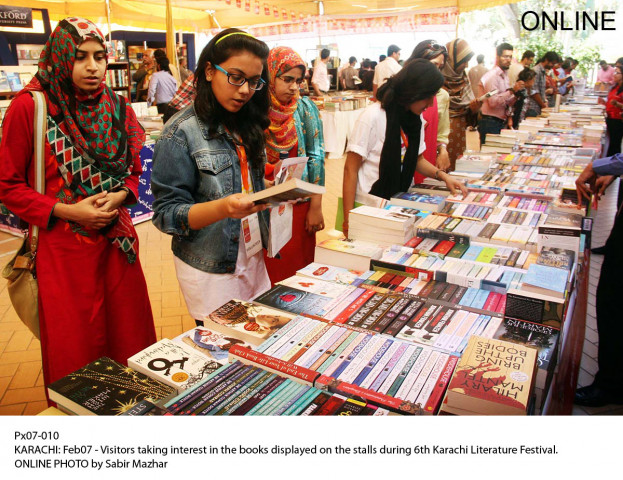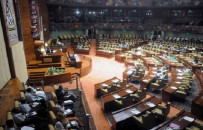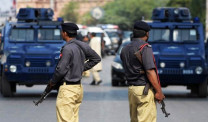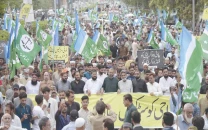‘What we choose to ignore says a great deal about us’
“But being set in Karachi and modern-day Pakistan, the characters were being cruel to each other by the fourth page!”

Visitors taking interest in the books displayed on the stalls during the 6th Karachi Literature Festival. PHOTO: ONLINE
When it comes to Balochistan, journalist and author Mohammed Hanif has a point: all that 90 per cent of Pakistanis know about the country’s largest province is that it is rich in minerals. “Beyond that, we know nothing. In our imaginations, it is a far-off land.”
The notoriously irreverent writer, known for commenting upon the trickiest of topics, was speaking at a session titled ‘The Satirical Pen’ on the second day of the sixth Karachi Literature Festival on Saturday.
“What we choose to ignore says a great deal about who we are, where we come from and where we are headed,” Hanif remarked, referring to the long march led by the Voice of Baloch Missing People’s leader Mama Qadeer, which received little coverage in the media.
Discussing journalistic responsibility in the wake of the Charlie Hebdo controversy, Hanif pointed out that many issues simply did not appear on the television or in newspapers - something that is just as important as what does appear. “Everybody has the right to speak but who has the microphone?”
Questioned by moderator Navid Shahzad about the paradox of being an author and a journalist at the same time, he said that it was easy to slip from being one to the other. “Being a journalist in Pakistan is a grim job, covering carnage after carnage after carnage. At some point, you decide that you might as well sit down and write a novel,” he explained.

“But when you work on just that one novel for months at a time, you get bored and think, why don’t I just go cover Imran Khan’s dharna?”
Talking about how he came to write his first book, A Case of Exploding Mangoes, Hanif said that he had been trying to investigate the death of former president Ziaul Haq. “Twenty years or so later, these things usually come to light, but when I tried to look into it, I realised I would never find out the truth. So I decided to make it up,” he said. “We will believe anything that we are told - we believe the fiction in our headlines.”
Shahzad pointed out that he had followed this “dark, cynical book” up with Our Lady of Alice Bhatti, which, according to her, was “no less than a love story”. “I was hoping it would be a light-hearted love story,” Hanif laughed. “But being set in Karachi and modern-day Pakistan, the characters were being cruel to each other by the fourth page!”
Published in The Express Tribune, February 8th, 2015.



















COMMENTS
Comments are moderated and generally will be posted if they are on-topic and not abusive.
For more information, please see our Comments FAQ